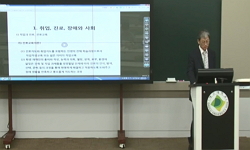장애인에 대한 정당한 편의제공은 장애인들이 생활 전 영역에서 타인과 동등하게 장소, 시설, 장치, 서비스 등에 자유롭게 접근할 수 있도록 하는 접근성(Accessibility) 보장을 위한 핵심 개념...
http://chineseinput.net/에서 pinyin(병음)방식으로 중국어를 변환할 수 있습니다.
변환된 중국어를 복사하여 사용하시면 됩니다.
- 中文 을 입력하시려면 zhongwen을 입력하시고 space를누르시면됩니다.
- 北京 을 입력하시려면 beijing을 입력하시고 space를 누르시면 됩니다.

장애인의 접근성 보장을 위한 법적 과제 : 정당한 편의제공 의무 국내 사례 현황 분석을 중심으로 = Legal Challenges to Ensure Accessibility for Persons with Disabilities : Focusing on the Analysis of the Current Status of Domestic Cases on the Obligation to Provide Reasonable Accommodation
한글로보기https://www.riss.kr/link?id=A109480074
- 저자
- 발행기관
- 학술지명
- 권호사항
-
발행연도
2024
-
작성언어
Korean
- 주제어
-
등재정보
KCI등재
-
자료형태
학술저널
-
수록면
1-32(32쪽)
- DOI식별코드
- 제공처
- 소장기관
-
0
상세조회 -
0
다운로드
부가정보
국문 초록 (Abstract)
먼저 UN 장애인권리협약 및 장애인차별금지법, 장애인등편의법, 교통약자법 등 관련 법제에서 장애인에 대한 정당한 편의제공을 어떻게 규정하고 있는지에 관하여 개관한 뒤, 개별 사례에 적용할 경우 특히 문제될 수 있는 몇 가지 쟁점들에 대해 검토하였다. 다음으로 장애유형 및 접근영역별로 선별한 국내의 주요 개별 사례를 분석해 보았다. 요청되는 정당한 편의제공 의무의 내용이 무엇이며, 어떤 문제 제기가 이루어지는지, 영향을 주고 받는 주요 요인은 무엇인지를 살펴보고, 연관된 제도들과의 관계 속에서 어떤 장치 마련이 필요한지에 관하여 논의하였다. 현행 법제의 개선에 관한 시사점을 도출하고, 장애인 접근성 보장을 위한 법적 과제로서 (1) 정당한 편의 형식으로 규정된 접근성 최소기준의 구분, (2) 접근성 및 정당한 편의제공 의무 적용범위 및 판단기준의 단계적 개선, (3) 장애인 접근성 구현을 위한 장애인복지법제의 활용을 제시하고, 각 세부 쟁점별 개선방향에 관해 제안하였다.
본 연구는 장애인에 대한 정당한 편의제공 의무 관련 국내 사례 분석에 기초하여 장애유형 및 접근영역에 따른 주요 쟁점을 검토하고 법제 특성을 고려한 개선지점을 모색하였다는 데 의미가 있다. 접근성의 최소 기준을 높여 가는 동시에 정당한 편의제공 의무 내용을 강화하고 효과적인 의무이행을 지원하기 위해 관련 법제를 정비하는 등 장애인의 접근성 보장을 향한 지속적 노력이 이어져야 할 것이다.
장애인에 대한 정당한 편의제공은 장애인들이 생활 전 영역에서 타인과 동등하게 장소, 시설, 장치, 서비스 등에 자유롭게 접근할 수 있도록 하는 접근성(Accessibility) 보장을 위한 핵심 개념이다. 장애인이 교육, 고용, 참정, 사법, 문화 등 모든 영역에서 사회에 완벽하게 참여하여 인간다운 삶을 누릴 수 있도록 하려면, 공동체의 시설, 정보 등이 장애인이 접근 가능하도록 보편적으로 개선되어야 함은 물론, 장애인 한 사람 한 사람에게 맞추어 필요한 개별 조정이 충분하고 효과적으로 이루어져야 한다. 이 글에서는 이러한 장애인에 대한 접근성 조치 및 정당한 편의제공 의무 규범 구조에 주목하여 국내의 사례 현황을 분석하고 장애인의 접근성을 보장하기 위한 법적 과제에 관해 고찰하였다.
먼저 UN 장애인권리협약 및 장애인차별금지법, 장애인등편의법, 교통약자법 등 관련 법제에서 장애인에 대한 정당한 편의제공을 어떻게 규정하고 있는지에 관하여 개관한 뒤, 개별 사례에 적용할 경우 특히 문제될 수 있는 몇 가지 쟁점들에 대해 검토하였다. 다음으로 장애유형 및 접근영역별로 선별한 국내의 주요 개별 사례를 분석해 보았다. 요청되는 정당한 편의제공 의무의 내용이 무엇이며, 어떤 문제 제기가 이루어지는지, 영향을 주고 받는 주요 요인은 무엇인지를 살펴보고, 연관된 제도들과의 관계 속에서 어떤 장치 마련이 필요한지에 관하여 논의하였다. 현행 법제의 개선에 관한 시사점을 도출하고, 장애인 접근성 보장을 위한 법적 과제로서 (1) 정당한 편의 형식으로 규정된 접근성 최소기준의 구분, (2) 접근성 및 정당한 편의제공 의무 적용범위 및 판단기준의 단계적 개선, (3) 장애인 접근성 구현을 위한 장애인복지법제의 활용을 제시하고, 각 세부 쟁점별 개선방향에 관해 제안하였다.
본 연구는 장애인에 대한 정당한 편의제공 의무 관련 국내 사례 분석에 기초하여 장애유형 및 접근영역에 따른 주요 쟁점을 검토하고 법제 특성을 고려한 개선지점을 모색하였다는 데 의미가 있다. 접근성의 최소 기준을 높여 가는 동시에 정당한 편의제공 의무 내용을 강화하고 효과적인 의무이행을 지원하기 위해 관련 법제를 정비하는 등 장애인의 접근성 보장을 향한 지속적 노력이 이어져야 할 것이다.
다국어 초록 (Multilingual Abstract)
First, after an overview of how related laws, such as 「CONVENTION ON THE RIGHTS OF PERSONS WITH DISABILITIES」, 「ACT ON THE PROHIBITION OF DISCRIMINATION AGAINST PERSONS WITH DISABILITIES AND REMEDY AGAINST INFRINGEMENT OF THEIR RIGHTS」, 「ACT ON THE GUARANTEE OF CONVENIENCE PROMOTION OF PERSONS WITH DISABILITIES, SENIOR CITIZENS, PREGNANT WOMEN AND NURSING MOTHERS」, and 「ACT ON PROMOTION OF THE TRANSPORTATION CONVENIENCE OF MOBILITY DISADVANTAGED PERSONS」, several issues that may be particularly problematic when applied to individual cases were reviewed. Next, major individual cases in Korea selected by disability type and access area were analyzed. We examined the content of the obligation to provide reasonable accommodation, what issues are raised, and the main factors that affect them, and discussed what mechanisms are needed in related systems. We drew implications for the improvement of the current legislation, and as a legal task to ensure accessibility for the persons with disabilities, We proposed (1) the classification of the minimum accessibility standards prescribed in a form of reasonable accommodation, (2) the step-by-step improvement of the scope of accessibility and reasonable accommodation provision obligations, and (3) the use of 「ACT ON WELFARE OF PERSONS WITH DISABILITIES」 to implement accessibility for the persons with disabilities, and suggested directions for improvement for each detailed issue.
Based on the analysis of domestic cases related to the obligation to provide reasonable accommodation to the persons with disabilities, this study is meaningful in that it reviewed major issues according to the type of disability and accessibility area, and sought improvement points considering the characteristics of the legislation. Continuous efforts should be made to ensure accessibility for the persons with disabilities, such as increasing the minimum standard of accessibility, strengthening the content of the obligation to provide reasonable accommodation, and reorganizing related laws to support effective fulfillment of obligations.
The provision of reasonable accommodation to the persons with disabilities is a key concept for ensuring accessibility that allows the persons with disabilities to freely access places, facilities, devices, and services on par with others in all areas...
The provision of reasonable accommodation to the persons with disabilities is a key concept for ensuring accessibility that allows the persons with disabilities to freely access places, facilities, devices, and services on par with others in all areas of life. In order for the persons with disabilities to fully participate in society in all areas of education, employment, correction, justice, and culture and enjoy a human life, not only should the facilities and information of the community be universally improved so that the persons with disabilities can access it, but also the necessary individual adjustments should be made sufficiently and effectively tailored to each person. In this article, we considered the current status of domestic cases and tasks, focusing on the accessibility to the persons with disabilities and the normative structure of the obligation to provide reasonable accommodation.
First, after an overview of how related laws, such as 「CONVENTION ON THE RIGHTS OF PERSONS WITH DISABILITIES」, 「ACT ON THE PROHIBITION OF DISCRIMINATION AGAINST PERSONS WITH DISABILITIES AND REMEDY AGAINST INFRINGEMENT OF THEIR RIGHTS」, 「ACT ON THE GUARANTEE OF CONVENIENCE PROMOTION OF PERSONS WITH DISABILITIES, SENIOR CITIZENS, PREGNANT WOMEN AND NURSING MOTHERS」, and 「ACT ON PROMOTION OF THE TRANSPORTATION CONVENIENCE OF MOBILITY DISADVANTAGED PERSONS」, several issues that may be particularly problematic when applied to individual cases were reviewed. Next, major individual cases in Korea selected by disability type and access area were analyzed. We examined the content of the obligation to provide reasonable accommodation, what issues are raised, and the main factors that affect them, and discussed what mechanisms are needed in related systems. We drew implications for the improvement of the current legislation, and as a legal task to ensure accessibility for the persons with disabilities, We proposed (1) the classification of the minimum accessibility standards prescribed in a form of reasonable accommodation, (2) the step-by-step improvement of the scope of accessibility and reasonable accommodation provision obligations, and (3) the use of 「ACT ON WELFARE OF PERSONS WITH DISABILITIES」 to implement accessibility for the persons with disabilities, and suggested directions for improvement for each detailed issue.
Based on the analysis of domestic cases related to the obligation to provide reasonable accommodation to the persons with disabilities, this study is meaningful in that it reviewed major issues according to the type of disability and accessibility area, and sought improvement points considering the characteristics of the legislation. Continuous efforts should be made to ensure accessibility for the persons with disabilities, such as increasing the minimum standard of accessibility, strengthening the content of the obligation to provide reasonable accommodation, and reorganizing related laws to support effective fulfillment of obligations.
동일학술지(권/호) 다른 논문
-
대한민국 정부 수립 초기 민간인 집단희생 사건 관련 법령에 대한 헌법적 이해 ―제주4·3사건과 여수·순천10·19사건을 중심으로―
- 제주대학교 법과정책연구원
- 남중권
- 2024
- KCI등재
-
언론관계법상 언론자율규제제도의 실효성 제고를 위한 고찰 - 언론중재법ㆍ신문법상의 관련 제도를 중심으로-
- 제주대학교 법과정책연구원
- 조소영
- 2024
- KCI등재
-
중국의 항공우주산업 정책과 법제 - 기술수출통제를 중심으로
- 제주대학교 법과정책연구원
- junyuan wan
- 2024
- KCI등재
-
- 제주대학교 법과정책연구원
- 김혜정
- 2024
- KCI등재




 KCI
KCI KISS
KISS







